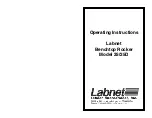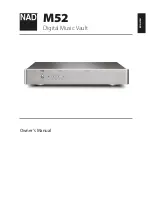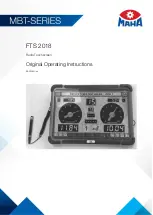
1)
Touch
Power
on the front touch panel. After the system
powers up the first time, the following screen appears:
2)
Touch
Enter
.
The system prompts you to set the date.
3)
To set the month, use the
Up
and
Down
arrows to change the numerical value
of the month.
4)
Touch
Stop
to move to the field to the right. Touch
Stream
to move
to the field to the left.
5)
Use the same process to set the
Day
and
Year
until you are satisfied
with your settings.
6)
Touch
Enter
to accept the settings, and move to the next screen to
set the system clock.
7)
Niagara systems use a 24-hour clock format for its system clock
entries. Use the
Up
,
Down
, and
Stream
buttons to set the hour and
minute of the system clock.
8)
Touch
Enter
to set the format. The screen appears confirming you
have successfully set up your Niagara system.
9)
Touch
Enter
to exit the setup menu and reboot the system.
The following screen appears:
Quick Start Guide
Niagara
®
7550
Congratulations on the purchase of your new Niagara 7550 system.
The following steps in this
Quick Start Guide
will help you set up and
configure your new streaming media system so you can begin stream-
ing or capturing video as quickly as possible. You can perform most of
the basic operations from the touch panel. The Niagara web interface
also allows quick and easy access to its operational features. You must
modify any advanced setup options of the encoders through this inter-
face before running an encoder session. Please refer to the
User Guide
on the included CD for more detailed instructions.
Complete the following steps to begin streaming:
AC power connector for 100-240 volts,
AC,
50-60
Hz
1
Plug the power cable included with your
system into this connector and plug the
opposite end into an AC power source.
SDI video input
5
The high-definition and standard-definition
serial digital interface (SDI) is a professional
video input that may include embedded
audio. SDI uses a COAX cable with a BNC
connector.
Unbalanced audio input
7
These BNC connectors with RCA adapters
provide left and right stereo input. RCA
connectors (standard consumer stereo
audio connectors) are on most video
players and video cameras.
Balanced audio input
8
These XLR connectors provide left- and right-
balanced stereo inputs. High-end audio
and video equipment may have these
professional connectors.
AES/EBU digital audio input
6
There are two stereo pairs of AES/EBU
digital audio, AES1 and AES2.
RJ-45 Ethernet connector
2
The system has two network connectors.
Use either the primary or secondary
plugs to connect to your IP network.
The network settings default to dynamically obtain an IP address from a
DHCP server on the network. For most network environments, you do
not need to modify these default settings. If the system does not find a
DHCP server or it remains unavailable on the network, it assigns its own
IP address.
Once connected to a network, you should be able to access the built-in
web server by browsing to the unique machine name (the serial number
is located on the bottom or side of the system). You may also set the IP
address through the web interface.
If you do not have a DHCP network or you cannot connect to the system
through its DNS name, you can connect a monitor
4
, mouse, and key-
board directly to USB ports
3
. The system has a Microsoft Windows 7
desktop.
The first time you power up the system, the system takes a few mo-
ments to boot up. The LCD display will present a series of menus that
will assist you in setting up the system clock and date.
10)
From a separate computer on the same network as the Niagara
system, launch a web browser such as Internet Explorer and enter
the
serial number
or
IP address
of your system in the address bar.
The serial number can be located on the bottom or the side of the
system in the format
hdxxxxxxxx
. The serial number and IP
address also appear on the LCD screens on the front panel.
11)
Click in the
User Name
field and enter
admin
as the user name.
Then click in the
Password
field and enter
admin
as the password.
Finally, click
Log In
or press
Enter
.
12)
After you enter your valid user name and password, the Welcome
window
and menu bar appear.
13)
To view available encoder profiles, from the menu bar click
Encoders > All Encoders.
This example demonstrates how to edit
a Windows Media encoder.
14)
Click
Edit
to the left of the Windows Media encoder to open the
Encoder Properties window.
Video
2.
Connect video and audio sources
Audio
3.
Connect to an IP network
4.
First start setup
1.
Connect to an electrical power source
Continued on back
Contact ViewCast Technical Support at
support@viewcast.com.
40-03261-04-A
© 2011 ViewCast Corporation. ViewCast
®
, Niagara
®
(and design)
TM
are registered trademarks of ViewCast Corporation or its subsidiaries. All other trademarks are the property of their respective owners. Product specifications and availability may change without notice.
US / Canada
l
800.540.4119
| Europe/Middle East/Africa
l
+44 1256 345610
|
Asia / Pacific
l
+852 2251 8778
Note:
Contact your network administrator for assistance if you are
unfamiliar with network settings.
3
1
2
3
4
Niagara 7550 front view
Niagara 7550 back view
5
6
7
8
Note:
You may start a stream from the Encoders window by click-
ing the red circle in the
Streaming
column. This action accepts the
current settings for the device. The circle changes from red to blue
once you start streaming.




















